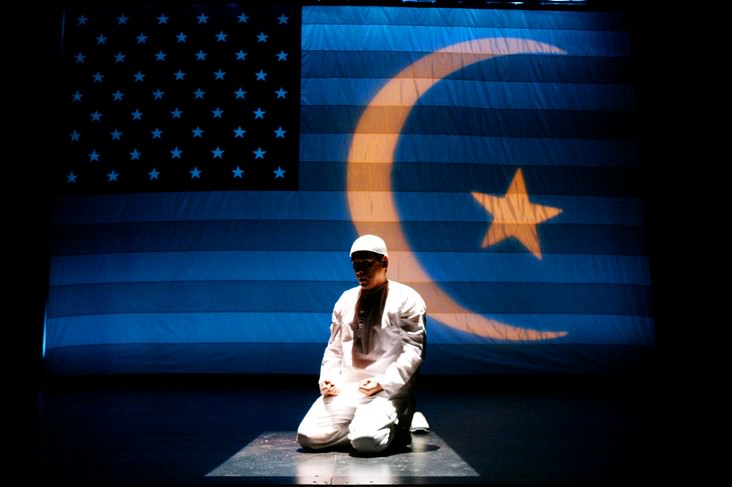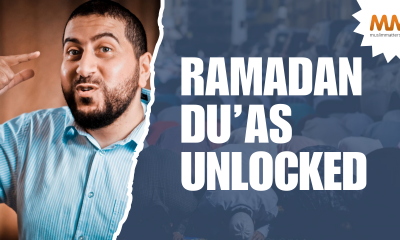Rap Songs, American Music, and Other “Evils”
“Then tell me what I can do, Mom!” my friend’s teenage son exploded after she expressed concern for the permissibility of him writing rap lyrics—though he intended to compose the songs as nasheeds (without musical instruments). Distraught, my friend asked my advice on what to do, as her teenage son was showing signs of becoming disgruntled with Islam itself.
“Stick to what is clear,” I suggested. “If there’s an issue that has different scholarly opinions or interpretations, just advise your sons to research it and pray on it. But don’t compel them to understand things as you do, even if you share with them why you believe what you do. Allah sees them as adults responsible for their own souls, and you should too.”
Unfortunately, this simple advice—which Islamic scholars continuously give non-scholars who divide themselves based on permissible differences—is what is missing in Islamic classes aimed at teaching Muslims “authentic” or “traditional” Islam. Consequently, many Muslim youth fail to see Islam as establishing a personal relationship with Allah; instead, they see Islam as living a life of extremism—as evidenced by the “fundamental” obligation they learn in their masajid: Scorn anything “American,” especially rap and popular music.
Keep supporting MuslimMatters for the sake of Allah
Alhamdulillah, we're at over 850 supporters. Help us get to 900 supporters this month. All it takes is a small gift from a reader like you to keep us going, for just $2 / month.
The Prophet (SAW) has taught us the best of deeds are those that done consistently, even if they are small.
Click here to support MuslimMatters with a monthly donation of $2 per month. Set it and collect blessings from Allah (swt) for the khayr you're supporting without thinking about it.
Although historically, the controversy surrounding the permissibility of music deals primarily with the use of musical instruments, today the discussion has expanded to include anything that “sounds” American. As such, many Islamic teachers from predominately Muslim countries and Islamic teachers who studied from them, teach that Islamically permissible songs cannot “imitate the disbelievers” (i.e. imitate American culture). Interestingly, even amongst those who view musical instruments as permissible, many view rap and American music as prohibited, while “cultural” music from predominately Muslim countries is allegedly allowed in Islam.
Spiritual Crisis: “I Never Thought It Would Be Me”
Not surprisingly, amidst all the confusion, many Americans are becoming disillusioned with Islam itself, and the phenomena of spiritual crisis and American Muslim apostates are becoming more and more common. The racism, colorism, nationalism, and immigrant-culture worship that are being taught as part and parcel to Islam itself are becoming too much to bear; and Islam is beginning to look less like the simple, balanced religion these Americans accepted when they first became Muslim and more like a ploy to control, subjugate, and spiritually abuse them.
As the child of American converts to Islam myself, I went through similar struggles in both indigenous American and immigrant Muslim communities, who seem to be perpetually on opposite sides of a religious tug-of-war in staking claim to “true Islam.” And almost every day I learn of someone else going through a similar spiritual crisis, hence the inspiration behind the Umm Zakiyyah YouTube Channel, which I established to support and encourage other Muslims struggling spiritually, who simply wish to live as Muslims independent of confusing and contradictory teachings. I titled my first video reflection “I Never Thought It Would Be Me” because amidst all the religious tug-of-war and the never-ending man-made list of haraam, which is often at the expense of American culture, I doubted my own ability to practice Islam, and I never imagined this would happen to me.
Through spiritual outreach and dialogue I hope to communicate with American Muslims, as well as other striving Muslims worldwide, to assure them that we can be “real” Muslims—despite what many cultural and sectarian Muslim groups teach about the “evils” of our culture under the guise of Islam.
Umm Zakiyyah is the internationally acclaimed author of the If I Should Speak trilogy and the novels Realities of Submission and Hearts We Lost. To learn more about the author, visit ummzakiyyah.com or subscribe to her YouTube channel.
Copyright © 2014 by Al-Walaa Publications. All Rights Reserved.


 #Islam2 weeks ago
#Islam2 weeks ago
 #Life1 month ago
#Life1 month ago
 #Islam1 month ago
#Islam1 month ago
 #Islam4 weeks ago
#Islam4 weeks ago




















Juma Mohamed Mtema
March 17, 2014 at 2:41 AM
Muslim American face a lot of Fitnas because of American Culture but that should not be discouraged from following Allah we as human beings we were created in different cultures that is the wish of ALLAH and being human specifically Muslims we should continue to lean more Muslim teachings and strive to pursue Islamic teachings as much as possible as no body is perfect. Subuhanah Allah! Allahu Akbar
Fatma kalkan
March 17, 2014 at 2:52 AM
Muslim world is not consist of Saudi Arabia infect their wiews are not wide spread. I am from Turkey and in Turkey no one thinks that all Americans are disbelievers and I have many friends from different Muslim countries that they believe just like Turks. Please don’t be discourage by Wahabis they do not represent all Muslims in fact they are small group among more than 1,3 B Muslims. Surely American culture has good sides and millions of Americans are good people and they practice their own religion. Islam respects religious freedom. And discrimination is forbidden. I recommend you to visit Turkey you will be treated very nicely Muslim American or any other American. Saiudies does not represent all Muslim nations or Sunni Islam .
Desert Rose
March 17, 2014 at 10:28 AM
Let’s not kid ourselves here!! Turkey is not exactly the model for an ideal Islamic culture. On the contrary, I think Turkey has done more to distort the image of Islam by showing what a secularised Islam ought to be. A quick browse of Turkish TV channels goes to show just much Turkey doesn’t want to be associated with Islam. What’s more, Turkish TV dramas have infected most of the Islamic worlds by normalising “making out” sessions and sex scenes. Other non-Islamic practices are more rampant in Turkey than most other Islamic countries. Now, I’m not naive enough to paint all Turkey with the same brush, as I am sure the majority of Turkish people are Allah fearing, but I refuse to accept the notion that Turkey is superior to Saudi Arabia or other more conservative Islamic nations. Instead, the focus shouldn’t be on governments, but rather on communities. As there are many Islamic communities in Saudi Arabia, Turkey, USA and other parts of the world who project the best face of Islam by caring for one another, being productive members of their communities and living in peace and harmony.
Ann Schauen (@annschauen)
March 18, 2014 at 2:48 PM
as a turk myself, I have to admit that I agree with you. the focus should never be on governments which are but a natural extension of the current secular world system; we should rather emphasize on the efforts and the goodwill of the muslim communities living in these countries.unfortunately most of the time we have the penchant to confuse the local/historical culture with what is Islamic or not, so I find Umm Zakiyyah’s distinction to be fair and needed..
Hisham
March 19, 2014 at 9:33 AM
The biggest boost to spreading indecent stuff on tvs in the Arabs world and the Gulf in particular has not been Turkish stuff, rather the media outlets owned by the Saudi Prince Waleed, But of course it is easier to blame Turkey/the West
Isma'il Abu Yaseen
July 4, 2019 at 11:32 AM
Masha’allaah,well said!
Mahmud B.
March 17, 2014 at 11:20 PM
There is no one out there who calls themselves a Wahabi
We should stop calling muslims from saudi arabi “Wahabi’s”. There is no such thing
Al-Wahab is one of Allah’s names by the way
See what Yusuf Estes has to say about this
http://www.youtube.com/watch?v=NFsoI3IYkrU
melanie
March 17, 2014 at 10:29 AM
SubhanAllah, there is good and bad in every culture..Allah himself says he made us different tribes so that we might know one another…Why do we make this so difficult??? After you get over the initial mistrust/awkwardness you will find so many things you never knew about!! The world is an amazing place.
GregAbdul
March 17, 2014 at 11:46 AM
There is simple difference in the indigenous versus native American Muslim dichotomy, but at the same time, it is complicated. In my masjid and in organizations run by immigrant Muslims, they tend to assume because I am American, that I don’t know Islam. I know the regulars at my masjid and they know me. Yet, we will have a function and the once or twice a year immigrant Muslim will come up to me and marvel at me for reading Quran or stare at me, wondering why I am a black American in a group of Indians, or tell me I am not following one of their cultural rules they wrongly think is Islamic (the most extreme example was a guy telling me it is not allowed to read the Quran in the back of the masjid because when he walked or stood in front of me, his butt would face the Quran). For me, the biggest shock was me changing my name and having many immigrants actively discouraging me from doing so. In our community there was a strong opinion five years ago, that you should not change your name unless it was haram. Another opinion was that you must keep the name of your father. This second one has cultural and racial dimensions. Siraj Wahaj told us in a lecture and I still don’t think they get it: “My ancestors did not come here on a passport.” So when I change my last name, I am not changing the name given to me by my father. My father was denied the chance to be who he was and was basically driven into drinking, hard labor and a short life. He certainly had no chance to learn about his ancestors in West Africa. A black American has a sort of exemption on the last name thing, at least at conversion, because our names were taken from our ancestors when we came to America. So while some majids create a false division, there was a point for me where they were demanding I maintain an American identity in the way they, as immigrants, thought I should maintain an American identity. The joke about that is that every black American has to consciously our unconsciously develop a dual consciousness: one American and one black. There are those who use Islam as an anti American statement, but if you live in the US, that’s not a logical position.But even the the anti American crowd is engaged in the all too common American behavior of rebellion. I live in an area where there is basically a conspiracy by the leadership that we make sure we don’t take anyone to court, no matter how much the other side is over the line. The most we do is to demand letters of apology. Suing and making people pay is how you fight in this money driven place. Anyway, it’s a simple dichotomy, but depending on the immigrant group you deal with, there are many manifestations and our goal is to be Muslim in the way acceptable to Allah. I have many faults and the once a year people are not much offense to me as much as the super, pretend-perfect Muslims who do not find humility in the salah. May Allah make us more love our brothers and sisters we are supposed to be and may Allah have Mercy on me and correct my many faults.
Lars Bendixen
March 17, 2014 at 2:16 PM
This is exactly what I have been debating with some local immigrant brothers in my community. These problems are so common. JazakAllahkhair for speaking out.
ArafatNY
March 17, 2014 at 4:07 PM
I recently moved to my community which is 90% pakistani and I am of indian/bengali decent. However, I look very pakistani, so usually when I first meet an elder I get a lot of love in the way they give me salam, their tone and how they ask me in urdu about myself (how are you, age, etc) but after the elders find out Im not pakistani, I notice the change in tone, less salams, eye contact and such. now a days, when I go to the masjid I just feel like an outcast of some sort and barely get the warm feeling I use to get or the warmth I get from folks that still think Im pakistani.
what should I do?
Bro. Isa
March 17, 2014 at 4:19 PM
Alhumdulillah this is a good article and as a second generation African-American Muslim I can definitely understand though this topic never ceases to amaze me. Coming from a family that learned Islam under Imam Warf Dean Muhammad I’ve always had a strong sense of the harmony of my African-American identity with Islam. But when I became more involved with the majority Muslim community I started to see these odd (and somewhat comical) prejudices that have little to know Islamic grounds to stand on.
Long story short, this is a much needed discussion. JazakAllahKhairum
AbdurRahman Ibn Mas'ood
March 17, 2014 at 5:12 PM
This is not directed at the sister in particular (my wife is a big fan of your books btw) but at the plethora of articles I’ve seen on this. I’m tired of hearing us Western Muslims (especially Americans tbh) brag on about how amazing, cultured and sincere we are in the practice of our deen as compared to our brothers and sisters in the east.
I know this is used as a context to help us Muslims in the West understand how important it is to not see living in the West as being a dichotomy of I’m either on this train or off it, but we need to find a way of doing it without always sounding like Muslims in the East are doing it wrong and we are somehow doing it right. Visit Turkey, Tunisia or Malaysia and the Muslim world is not so homogenously unlivable anymore.
I too have spent the past 4 years in KSA not only studying Islam but also spending 20+ hours every week with Saudi teenagers, and I can tell you for a fact that even if the context is different most of the deen and life issues these kids go through are in essence not too different from the issues Muslims in the West go through.
This is not to distract from the importance of the main topic being made, but simply in how we look at it.
GregAbdul
March 18, 2014 at 3:19 AM
Brother for me, the issue is Civil Rights. We have a long history in America of teaching the white Christian man that he can’t be open about his hatred for black people. We are now to the point that the white hateful political party constantly uses coded language (dog whistles) when wanting to remind white audiences of black inferiority. So whites have a long history of being told to at least act in a decent way, even if you are full of racism. Many immigrants do not know this experience and I can say as a black person, I sometimes find more open racism at my masjid than I do in the white Christian world. Blacks and non immigrants are not perfect and we have to work through these issues in a better way as well, but the fact is, I have seen sisters specifically, terrorized at the masjid because they were not Pakistani or Arab. Maybe us guys ignore it more. Allah knows. Today we have Muslim women who come to the masjid and are reduced to tears. I think we are trying not to all point at one group. I will say the criticism I have of my black American masjids is that sometimes they bend over backwards not to offend the Farrakhan fake Muslims. The NOI is a hate organization. The NOI is not true Islam and those of us who know better should know that making peace by hiding and making excuses for hateful black people is no solution. However, those of us not in the hate cult often end up at immigrant masjids and we are making and adjustment…and simply talking through some of our issues here.
Yusuf Smith
March 18, 2014 at 9:38 AM
My experience is that racist attitudes among immigrant populations have not been examined or accounted for because of the dogma that white racism causes more harm and therefore is the only racism that really matters. There is even the doctrine that only white racism is racism because “whites have the power”, even though in the Muslim community, we don’t.
Examples are that immigrant families often will not allow their children to marry Muslims from other ethnic backgrounds, particularly converts (often, blacks more than whites). Among whites (here in the UK at least), you could not express the view that inter-racial marriages are wrong or that you do not want a black son/daughter-in-law or grandchild in polite company, but refusals of marriage for racial reasons are common in the Muslim community. I have had more than one refusal on those grounds and I’m sure every convert has, or knows someone who has.
Fatima
June 2, 2014 at 2:37 AM
Death to white supremacy :)
ConfusedGuy
June 9, 2015 at 4:03 PM
How do you know that NOI is not real Islam? Most Orthodox (Sunni) Muslims (of whatever race) seem to welcome them with open arms, and agree with most of what they say, if not every single thing that they say.
I know that I as a “white man” I am considered to literally be the Devil, PERIOD, and responsible for ALL of the evil in the world, according to black Muslims (NOI?). Have you not seen what they are saying in the countless videos for instance (including the calls for violence)?
And according to other Muslims (Sunnis), whites are at the very least, considered to “figuratively” be the Devil (and the lines of literal and figurative seem to blur). They would say that all white people are indeed, pretty much evil, and of course responsible for all the evil and bad in the world. Whites in many ways, it seems, are considered to be a bad, despicable, unworthy race that have done nothing but brought misery, heartache, and evil into this world.
Bashiru Ismail
March 17, 2014 at 6:37 PM
Well, I don’t know if I’m in a position to speak but I think the bottom-line is Islam is practiced from the heart. Even in the time of the prophet, he gradually converted his people into full muslims. We need to understand that especially when one doesn’t come from a “native muslim” or “muslim predominant” environment, it is sometimes extremely difficult to practice Islam fully and happily. Sometimes, it is so so lonely to be muslim.
Sadly, even the muslim community that is supposed to be united together in harmony is divided amongst sects… beliefs… cultures…and schools. Enjoining the muslim ummah and embracing one another as one is suppposed to be the foundation of islam itself. Why is there so much discrimination without even trying to understand? Why do we judge one another without even getting to know one another? Why do a sect of muslims look down on another sect of muslims with scorn and discord? Why do we spend so much time discussing differences and dividing when our focus should be uniting and enjoining?
I believe as muslims we should look beyond race, colour, culture, nationality and even language barriers. Islam is supposed to unite us as one!!!
UmmAmmaarah
March 17, 2014 at 7:58 PM
Assalamu-alaikum. All these comments remind me of how divided we are despite claiming to be one. I find it sad and amusing at how Muslims from different cultures look down upon those different from them. At the ‘Islamic School’ that my daughter attends, most ‘White Arab’ mothers will not even acknowledge or say Salaam to the darker skinned non-arabs; at any school gathering it’s always cliques, and while I do understand that it’s always more comfortable to hang out with birds of the same feather, it is disheartening to watch the intentional ‘ignoring’ of the other groups, it seems very counter-productive and damaging. And of course, this is a scene you see at most masajid as well sadly enough. May Allah guide us to the best practices of our Deen and make us one.
Hyde
March 17, 2014 at 9:24 PM
Never understood this obsession to lining up Saudi Arabia to the paragon of Islam. Rubbish really. From homosexuality to pornography to degenerate consumption mentality to straight up Whabbyiyya Jaliyahaa to building the tower of doom in The Noble Sanctuary, let’s please stop issuing edicts of Islamic perfection to Arabia (and yeah time to strip the title of Saudi from the name; Saud’s reign ends).
And what is wrong with being an American Muslim? I propose that America is probably the best country to be Muslim.
I’m a Muslim in America who likes Celtic culture and studies The Civil War, and I don’t see anything wrong with that ?
Fatima
June 2, 2014 at 2:36 AM
And you are a settler colonizer who sees nothing wrong with living on stolen native land?
Hyde
June 8, 2014 at 9:30 PM
Where did you get that from my comment ? When did I say anything that juxtaposes that ?
ZAI
March 17, 2014 at 10:59 PM
Good article and agree w/ most of the main points…
Umm Zakiyyah, isn’t it necessary as well to address the popularity
of the Pan-Islamic Muslim nationalism among many American-Muslims, and Muslims
everywhere else, as well? This ideology also contributes mightily to myopic or narrow negative views of America or the feeling that being an American-Muslim is somehow
contradictory because “our” loyalty lies elsewhere. It promotes a stark
dichotomy of “us” vs. “them” within a ideological framework that is all-encompassing
and absolute, rather than a more piecemeal view of looking at issues individually
and fostering a more nuanced discussion where we can be fully American while
criticizing some things about America or fully Muslim while disagreeing with Muslims
elsewhere…
Mahmud B.
March 17, 2014 at 11:23 PM
I want to say to the author of this blog post: Why dont you put your books on Amazon for the Kindle. Its free to publish them there as ebooks. And you get worldwide exposure. And price your ebook there for $2.99 to start
All the best
Noorunnisa
March 17, 2014 at 11:28 PM
We cannot change people. We cannot change governments (not so easily, at least). But God has given us the ability to think and to act according to the Qurán. If each of us here can persuade our families and our spheres of influence to stop racist and divisive thoughts, be kind to each other and turn to God for guidance, in syaa’ Allah, slowly but surely, we will all see a better world around us :-). Accusations and blame are counterproductive. Assalamu’alaikum Wr Wb!
Yusuf Smith
March 18, 2014 at 9:45 AM
It is not only Gulf Arabs who have these kinds of attitudes to westerners and western clothing and other customs; I have seen it among Indo-Pak Muslims as well. I believe the reason is that these are places where colonialism either didn’t happen (as with Saudi), or left the customs and scholarship of Muslims alone. People aren’t expected to follow western customs in dress by the state, which in some Muslim countries treats traditional Muslim dress as a sign of subversion. Even young men can wear traditional robes or shalwar-kameez without fear; in Egypt, for example, they would be subjected to harassment or arrest. So it is understandable that Muslims resist the spread of alien, un-Islamic customs in places where they are not forced on people.
Mobeen
March 20, 2014 at 4:03 PM
Great article Umm Zakiyyah. One point that was made that I would raise contention with is the following statement: “Though the actual Islamic caution against “imitating the disbelievers” concerns only matters that are specific to systems of disbelief as opposed to general cultural patterns, it is rare that this distinction is actually made in Islamic classes and lectures on the subject, especially when America or “the West” is discussed……In Islam, as a general rule, worldly matters such as hairstyles, clothing, food, recreation, and any culture-specific speech or behavior do not fall under the “imitation” category. Allāh has made humans different nations and tribes, and naturally, these differences will manifest themselves in how people dress, speak, and interact.”
Is that true? I would be curious to read any scholarly sources if you have them that elaborate on this particular point.
In my limited readings and study of the topic, the imperative to avoid certain types of imitation is substantiated textually through a few key narrations – of them is the Prophet’s instruction for men to trim their mustaches and grow their beards, the narration about the lizard hole, and the famous hadith “man tashabbaha bi qowmin, fa huwa minhum” (whoever imitates a people is from them). More broadly, one will find a theme in the hadith literature highlighting the Prophet’s desire to establish a unique Muslim identity in many areas, though certainly not all.
Taking into account the role of culture within the larger context of Islamic law, it is possible that certain actions constitute a type of reprehensible imitation in, say Saudi Arabia or Pakistan, that would not be reprehensible in the United States (again, this is based on my limited studies from teachers of mine). These rulings may be informed by a variety of factors, and anti-Western sentiment should also be viewed in light of those socio-cultural realities and the states geopolitical experiences with the west. For example, it is possible to view the proscription of isbaal as a general prohibition of dressing in an arrogant format, and in certain societies “American clothing” (whatever that is) may be a sign of cultural rejection and arrogance which scholars in those regions are seeking to curb. There are other excuses I could conjure up if one wanted to try and validate why a foreign scholar may issue such a ruling.
I think as American Muslims we are very sensitive of attempts by foreign scholars to cast judgments on our societies that to us make very little sense or are grossly misinformed. Unfortunately, I think we rarely extend that same courtesy to scholars elsewhere and a common trend I’ve come to notice is this dichotomy where one expects foreign scholars not to comment on his/her local affairs while summarily dismissing the judgments/rulings of those scholars when speaking to their own societies (please dont misconstrue this as discussing your specific experiences per se, this is more of a general note).
Lastly, though one can certainly be blamed for misdirecting their focus in regards to what constitutes reprehensible imitation, or the general misapplication of the principle, I think we should be wary of dismissing it altogether (I don’t think that’s what you were doing, but many do), lest we throw out the baby with the bathwater. Allah knows best.
GregAbdul
March 22, 2014 at 10:44 PM
al hamdulillah, your question is put forth in a very scholarly and technical way.
aksayed
March 27, 2014 at 12:40 AM
A very large part of the Qur’an refers us to the Signs of Allah (SWT) in His creation. These include the diversity and variety that exist in plant and animal life, as someone has said in these comments that “He has made us into nations so that we may understand one another”. Therefore, it is absurd to even think that the flower of the rose plant is Islamic and all others are un-Islamic, let alone discriminate against anyone of them. Hence, the different plants lives with their different flowers, fruits, leaves, size, shapes, colours, etc, are like the different cultures, customs, traditions, languages, socio-economical and political affiliations, etc, of different nations. This means that in the unified field of the Islamic way of life, there is no universal sign, symbol, name, identity, culture, custom, tradition, dressing, language, socio-economical and political affiliation, etc, like in plant and animal life. Muslims are required to preserve the different cultures, customs, traditions, languages, etc, in their pure forms using the injunctions of the Qur’an, like the Prophet (SAW) preserved Arab culture, custom, tradition, etc, discarding paganism of his time, for all Arabs of the Arabian Peninsula. Hence, Muslims who give preference to the knowledge of the Hadith over that of the Qur’an misunderstand Islam and divide the ummah. Furthermore, it needs to be understood that our mission of PEACE in the Islamic way of life is like all missions of peace that contains the components of DIVERSITY, UNITY and JUSTICE, as per the knowledge of the Qur’an. A very large part of the Qur’an refers us to the Signs of Allah (SWT) in His creation. These include the diversity and variety that exist in plant and animal life, as someone has said in these comments that “He has made us into nations so that we may understand one another”. Therefore, it is absurd to even think that the flower of the rose plant is Islamic and all others are un-Islamic, let alone discriminate against anyone of them. Hence, the different plants lives with their different flowers, fruits, leaves, size, shapes, colours, etc, are like the different cultures, customs, traditions, languages, socio-economical and political affiliations, etc, of different nations. This means that in the unified field of the Islamic way of life, there is no universal sign, symbol, name, identity, culture, custom, tradition, dressing, language, socio-economical and political affiliation, etc, like in plant and animal life. Muslims are required to preserve the different cultures, customs, traditions, languages, etc, in their pure forms using the injunctions of the Qur’an, like the Prophet (SAW) preserved Arab culture, custom, tradition, etc, discarding paganism of his time, for all Arabs of the Arabian Peninsula. Hence, Muslims who give preference to the knowledge of the Hadith over that of the Qur’an misunderstand Islam and divide the ummah. Furthermore, it needs to be understood that our mission of PEACE in the Islamic way of life is like all missions of peace that contains the components of DIVERSITY, UNITY and JUSTICE, as per the knowledge of the Qur’an.
archerofmusings
March 27, 2014 at 10:59 PM
@aksayed obviously brother you have misunderstood islamic legislation completely. What do you mean
“Muslims who give preference to the knowledge of the Hadith over that of the Qur’an misunderstand Islam and divide the ummah. ”
When the the only way the Holy Qur’an can be understood ia through the Prophet s life and hia sayings. There are many verses whicg are general but do not apply in specific circumstances which leads us to understanding traditional sciences of islam like usul. This Is why many Muslims ignorant of these sciences start to make their own interpretation like the above by yourself.
Regarding the written comments in the article that:
“Though the actual Islamic caution against “imitating the disbelievers” concerns only matters that are specific to systems of disbelief as opposed to general cultural patterns, it is rare that this distinction is actually made in Islamic classes and lectures on the subject, especially when America or “the West” is discussed……In Islam, as a general rule, worldly matters such as hairstyles, clothing, food, recreation, and any culture-specific speech or behavior do not fall under the “imitation” category. Allāh has made humans different nations and tribes, and naturally, these differences will manifest themselves in how people dress, speak, and interact.”
This is not a correct evaluation of the hadeeth as many aspects of culture derive from other disliked values such as immodesty, arrogance, indecency, leading to zinah and the likes. Though it doesn’t come directly under the ‘imitation’ hadeeth but it is given that impression which makes it problematic. Therefore the above qouted statement should be looked into with a scholar of a high calibre and understood correctly or it will lead to a semi-muslim identity which has existed for 1400years even in non muslim countries. The difference was they didn’t ALWAYS ‘do what the Romans did in Rome’.
Hope this clarification was understood.
Wallahul haadi
aksayed
March 31, 2014 at 12:57 AM
It is true that the Qur’an instructs us to “follow Allah and the Apostle”. But it also instructs us “to obey the Prophets according to the Will of Allah” (Al-Qur’an 4:64). In addition to this, it also instructs the Prophet (SAW) “not to say or do anything” in his deen (way of life, not religion) that was not revealed to him in the Qur’an (Al-Qur’an 69:44-46). Furthermore, it needs to be understood, according to the above mentioned verses of the Qur’an that the Sunnah of the Prophet (SAW) is “the path and the practice” of the Qur’an and not that of the Hadith or any other teachings or practices outside of the Qur’an. This is one of the fundamental teachings of Tauhid, which requires absolute unity between the Word of God and the sayings and doings of the Prophets.
Hence, the achievements of the Prophet (SAW) which impress me according to the knowledge of the Qur’an are found in world history. For example, he was only one in history who was “most extremely successful in both the secular and religious levels”. He achieved this feat by replacing the dichotomy of the secular and religious with “the all truth” found in the revealed knowledge of the Qur’an. By this process, he did not only eliminate extremism and fundamentalism, both secular and religious, but also eliminated the falsehood and ambiguity found within and between these divisions in every aspects and dimensions of our lives. This was the most basic and dynamic Sunnah of the Prophet (SAW). Then why are the majority of the Muslims following the religious path of taqlid, aqidah, silsila, khanqah, sainthood, priesthood, sects and madhabs to separate the knowledge of the secular and religious? Does the Qur’an not tell us to eliminate the dichotomy of the secular and religious and secure all true knowledge of both secular and religious as one unit of knowledge by the natural and rational process of ilm-ul-yaqin (certainty of knowledge by inference or reasoning), ayn-ul-yaqin (certainty of knowledge by seeing and observing) and haqq-ul-yaqin (absolute knowledge, like this is a pen, etc)? Is this ignorance of the Qur’an not due to the influence of the Hadith or giving preference to the Hadith rather than the Qur’an?
Thus, the Prophet (SAW) was “Pope and Caesar” at the same time because he based his Faith in Allah (SWT) on sound reason and logic, which were inspired by the Qur’an and not by his own thought process or imagination. Therefore, when he required proof of the existence of God, the Qur’an provided it. Likewise, when he required answers on evolution and the creation, the Qur’an provided it. In addition to this, world history records the fact that “he was the founder of twenty terrestrial empires and one spiritual empire”. He did not go around to the Western part of his empire telling people, “Look at you, you look like Bush and Blair” because they did not keep a beard and wore the kurtha. Likewise, he did not impose the beard on Muslims of his time in Arabia because the Qur’an did not instruct him to do so. They kept beard, wore the kurtha and sat on the floor and ate their food even before he was born. It was their custom and tradition to do so. All the Prophet (SAW) did was take out the paganism from their custom, culture, tradition, etc, as per the knowledge of the Qur’an. We are to do the same with all customs, cultures, traditions, etc.
Thus, the practical application of Hadith does have its problems. Not only does it not tolerate the diversity of the different cultures, customs, traditions, etc, or the inclusion of the secular, but it does not also encourage the progress and development of the ummah according to science by stating that it is bid’ah to use the microphone in the mosque or the printing press to print copies of the Qur’an because the Prophet (SAW) did not use these modern day developments. About ten years ago, Islamic scholars in Turkey acknowledged all these problems of the Hadith after a “massive NO to Shariah Law” by the people of Turkey, and took a decision to rewrite the book of Hadith so that it would collaborate with the Qur’an. I don’t see how that would make a difference to Shariah when the Qur’an dictates the path and practice of the Sunnah in a better manner than the Hadith as the “mother of all books”. Did not the first Caliph of Islam burn all the Hadith he wrote before his demise and did not the second Caliph of Islam consider it improper to write the book of Hadith as an additional source of information to the Qur’an? Why?
archerofmusings
March 31, 2014 at 2:37 AM
Aah now you reveal your true colours, wr have a MUNKIR Al-HADEETH (rejector of hadeeth) in our midst. Or do you ascribe yourself as ahlul quraan(adherents to the Qur’an only)?
Nontheless your arguments are old and flawed, all of the claims that your group promotes have been answered long ago try reading this for a change:
https://www.google.co.in/url?sa=t&source=web&rct=j&ei=6ww5U_vML86kigey_YGIDw&url=https://archive.org/details/TheSunnahAndItsRoleInIslamicLegislationdr.MustafaAs-sibaee&cd=3&ved=0CCkQFjAC&usg=AFQjCNH8E4m_0JwprFQrbz6xNtlnwxzTkQ&sig2=i1tNuHaxg4lDu1zfpbrDdQ
May Allah guide you to the aqeedah of the ahlus sunnnah wal jamaah
aksayed
March 31, 2014 at 5:58 AM
This is a common occurrence among Muslims. If you don’t like the opinion of another Muslim call him or her a KAFIR or MUNKIR and form a sect against him or her, which is a major sin for which there is no forgiveness on the day of Judgment. I did not enter this debate to promote the Ahlul Qur’an. I am also not in agreement with some of them on some of things they say and do but I have not detached myself from them or any sect or groups of Muslims because they don’t agree with me. I think the ummah needs all the diverse opinions it can find to establish consensus on these opinions. Unfortunately, we don’t have an Assembly of God fearing and knowledgeable Muslims to establish such consensus between you and I. Therefore, brother I have no authority to judge you. I am only allowed to say what I think is the correct interpretation of the Qur’an if I am not in agreement with you, merely because Allah (SWT) compels me in the Qur’an to establish equity with the ummah on all matters that concern the ummah. Thank you for your discourse.Was-salaam.
archerofmusings
March 31, 2014 at 6:47 AM
Opinions are only valuable if there are based on saheeh aqidah of the ahlus sunnah wal jamah. To label someone from a sect (which does Ta’weel) is proven not only from the Qur’an (see the verses of hawa and zayg) but also the sahab and all the way down to the righteous ulama of the ummah.
Ahh but I can’t say much now can I ,as you don’t believe in an authority except yourself. I pray that Allah guides us well and give us the correct understanding. Ameen . Wsalam
Najash
April 22, 2014 at 10:09 AM
I’m Muslim who happens to be black and based in the UK. Alhamdullillah my parents came from Zanzibar in East Africa but I cant tell you how many times I’ve encountered the weird and never ending question as to WHEN DID YOU CONVERT? from mainly Pakistani Muslims here in London. Basically in their eyes since I’m black I cant be born a Muslim and my answer has always been simple, Islam Came to Africa (614) before it went to Indian Subcontinent…
I have encountered blatant racism from my fellow Muslims (esp Asians) in this country than whites but then again, not all Asians are racists but the fact still remains.
In the masjids they dont care t=if you cant speak Urdu…unless they are asking for Masjid donations and dont expect any duas for our brothers and sisters in Central Africa Republic (of course Palestine, Pakistan, Afghanistan is guaranteed)
This is Islam in the 21st Century England.
I
May 15, 2014 at 8:23 AM
Salam,
Such an intimidating topic to us All, Muslims.
I am born Muslim Alhamdulilah, I am Tunisian. If I might say something as an Arab Muslim is Please Do Not place KSA as the reference or the bottomheart of Islam today! It’s far away from being a model for Islam practices. It can only be an example of Hypocrisy, many everyday life aspects are dyed with culture/traditions rather than Islam. Nonetheless, there are in KSA several examples of a good Muslim, individually speaking.
In my humble opinion, there is no country/culture that represents Islam the best. It’s all related to the general consciousness, education and Morals. And Islam is all about Morals in the first place. the more people are traditions-free and repect each other, the better Muslims theyr are (Think about Malasiya, and many western counties).
I think that there should be a battle deep down in the soul/heart of every muslim to become a better muslim everyday without weighing other brothers and sisters in Islam or trying to have down looks at their cultures.
spine
May 31, 2014 at 7:55 AM
As an ex American convert to Islam I found difficulties with being a Muslim. Whether one agrees or not, Islam like all religions was fostered in a particular culture, and this culture has influenced the religion. When you convert you have to embrace aspects of that culture, you have to embrace their politics, etc. You have to fit within the parameters of their culture, and if you stray out even a little bit you’re a traitor or siding with the kuffar, there is a lot of peer pressure amongst the Muslims ive been around. To pit it in simple words you have to become subservient to them. People are different, we have our differences, how we think, what we eat, how we smell, our politics, etc. Sometimes these differences are so great you can’t connect. This is especially true when we don’t speak the same languages, never underestimate how important language. You really can’t build a bond and understanding with eacb other if you can barely communicate.
Saying all that, that isn’t really that important or the reason why I no linger practice Islam. My problem was theological, not social, I can deal with not having Arab or Pakista I fri3nds if Islam was true for me. My problems started with a book, a book on Qadar, the book is by a very excellent scholar from Jordan, he has an entire series on important topics. When I read the book it really destroyed my belief in a all knowing, a all powerful God. Maybe that is a reason scholars dissuade people from discussing Qadar. There are still a lot of things I loce about Islam, the justice, charity, modesty my, etc.; but the belief is illogical.
Umm ZAKAriyya
May 31, 2014 at 12:10 PM
May Allah make it easy for you brother. And help you find your way back to the truth. Qadr is incomprehensible . How did you make such a huge decision based on something no man can understand ?
And what about the Quran? The book
On Qadr even helped you reject the Quran? The Living Miracle?!
Fatima
June 2, 2014 at 2:30 AM
To sum it up, Umm ZAKAriyya wants Muslims on stolen native land to assimilate into amerikan settler colonializer project.
Yusuf
August 18, 2014 at 1:59 AM
If you have every lived in Saudi you would realize that these people are the worst Muslims and give Islam a bad name. I would rather live among non Muslim Americans because they practice Islam better than these Muslims in Saudi.